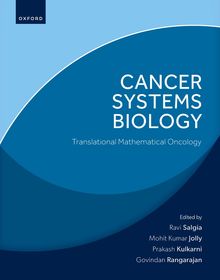
Cancer Systems Biology
Translational Mathematical Oncology
-
10% KEDVEZMÉNY?
- A kedvezmény csak az 'Értesítés a kedvenc témákról' hírlevelünk címzettjeinek rendeléseire érvényes.
- Kiadói listaár GBP 155.00
-
74 051 Ft (70 525 Ft + 5% áfa)
Az ár azért becsült, mert a rendelés pillanatában nem lehet pontosan tudni, hogy a beérkezéskor milyen lesz a forint árfolyama az adott termék eredeti devizájához képest. Ha a forint romlana, kissé többet, ha javulna, kissé kevesebbet kell majd fizetnie.
- Kedvezmény(ek) 10% (cc. 7 405 Ft off)
- Kedvezményes ár 66 646 Ft (63 473 Ft + 5% áfa)
Iratkozzon fel most és részesüljön kedvezőbb árainkból!
Feliratkozom
74 051 Ft

Beszerezhetőség
Becsült beszerzési idő: Várható beérkezés: 2026. január vége.
A Prosperónál jelenleg nincsen raktáron.
Why don't you give exact delivery time?
A beszerzés időigényét az eddigi tapasztalatokra alapozva adjuk meg. Azért becsült, mert a terméket külföldről hozzuk be, így a kiadó kiszolgálásának pillanatnyi gyorsaságától is függ. A megadottnál gyorsabb és lassabb szállítás is elképzelhető, de mindent megteszünk, hogy Ön a lehető leghamarabb jusson hozzá a termékhez.
A termék adatai:
- Kiadó OUP Oxford
- Megjelenés dátuma 2025. szeptember 18.
- ISBN 9780192867636
- Kötéstípus Keménykötés
- Terjedelem480 oldal
- Méret 283x234x34 mm
- Súly 1574 g
- Nyelv angol 696
Kategóriák
Rövid leírás:
Cancer Systems Biology provides state-of-the-art reviews and thought-provoking ideas in a concise and succinct manner. This insightful textbook is a crosspollination of concepts from multiple disciplines and experimental approaches to studying cancer.
TöbbHosszú leírás:
Over the centuries, civilization has seen considerable advances in healthcare. Cancer is among the most challenging healthcare issues that we face today, but a number of discoveries have led to better care. Despite all the progress and the promise regarding early detection and precision medicine, we are still faced with the nettlesome problem - cancer is a moving target. Even within an individual tumour, deep sequencing analyses now indicate multiple, phenotypically distinct subpopulations, whose representation seems to vary dramatically from one stage to the next as the tumour progresses.
Cancer Systems Biology provides state-of-the-art reviews and thought-provoking ideas in a concise and succinct manner. This insightful textbook is a crosspollination of concepts from multiple disciplines and experimental approaches to study cancer. The chapters provide new ideas and thoughts outlining how a quantitative picture of cancer can provide a deeper understanding of the disease, and how a systems level perspective may hold the key to fully comprehend how cancer arises and progresses.
Written by experts in multiple disciplines, including systems biologists, science researchers, physicists, mathematicians, and clinicians, Cancer Systems Biology provides a comprehensive, up-to-date, treatise devoted to understanding cancer from a systems perspective. Providing new conceptual insights that can aid precision medicine, it will be essential reading for academic researchers in the field, clinicians, graduate students, and scientists with an interest in cancer biology.
Tartalomjegyzék:
Section 1 - Cancer systems biology: An overview
The necessary existence of cancer and its progression from first principles of cell state dynamics
Non- genetic intratumoral heterogeneity and phenotypic plasticity as consequences of microenvironment- driven epigenomic dysregulation
Dimensions of cellular plasticity: Epithelial– mesenchymal transition, cancer stem cells, and collective cell migration
Phenotypic switching in cancer: A systems- level perspective
Morphological state transition during epithelial– mesenchymal transition
Section 2 - Cancer systems biology: New paradigms
Evolution- informed multilayer networks: Overlaying comparative evolutionary genomics with systems- level analyses for cancer drug discovery
Landscape of cell- fate decisions in cancer cell plasticity
The road to cancer and back: A thermodynamic point of view
Cellular plasticity as emerging target against dynamic complexity in cancer
Modeling phenotypic heterogeneity and cell- state transitions during cancer progression
Section 3 - Single cell 'omics' analysis
Decoding drug resistance at a single- cell level using systems- level approaches
Computational methods to infer lineage decision- making in cancer using single-cell data
Analyzing cancer cell- state transition dynamics through live- cell imaging and high- dimensional single-cell trajectory analyses
Emerging single- cell technologies and concepts to trace cancer progression and drug resistance
Section 4 - Computational approaches to drug development
Navigating protein dynamics: Bridging the gap with deep learning and machine intelligence
Cancer- related intrinsically disordered proteins: Functional insights from energy landscape analysis
Targeting RAS
Section 5 - Statistical methods and data mining, machine learning, artificial intelligence, and cloud computing
The power of connection—enabling collaborative, multimodal data analysis at petabyte scale to advance understanding of oncology
Interpretation of machine learning models in cancer: The role of model- agnostic explainable artificial intelligence
Applying cloud computing and informatics in cancer
Single-cell sequencing analysis focused on cancer immunotherapy
Application of artificial intelligence to overcome clinical information overload in cancer
Application of artificial intelligence in cancer genomics
Section 6 - Biomechanics
A role for mechanical heterogeneity in the tumor microenvironment in driving cancer cell invasion
Adaptation of cancer cells to altered stiffness of the extra-cellular matrix
Decoding mechano- oncology principles through microfluidic devices and biomaterial platforms
Understanding contribution of fibroblasts in inception of cancer metastasis from an evolutionary perspective
Cell competition in tumorigenesis and epithelial defense against cancer
Section 7 - Translational mathematical oncology
Modelling cell population dynamics during chimeric antigen receptor T- cell therapy
Modeling small cell lung cancer biology through deterministic and stochastic mathematical models
Mathematical models of resistance evolution under continuous and pulsed anti- cancer therapies
Integrating in silico models with ex vivo data for designing better combinatorial therapies in cancer
Tumour- immune co- evolution dynamics and it's impact on immuno- therapy optimization
Mechanistic modelling and machine learning to establish structure– activity relationship of nanomaterials for improved tumour delivery
Section 8 - Ecology, evolution, and cancer
Decoding cancer evolution through adaptive fitness landscapes
A case against causal reductionism in acquired therapy resistance
Group behaviour and drug resistance in cancer
The Fundamentals of evolutionary therapy in cancer
Section 9 - Critical transitions and chaos in cancer
Methods for identifying critical transitions during cancer progression
Chaos and complexity: Hallmarks of cancer progression
Cancer formation as creation and penetration of unknown life spaces




